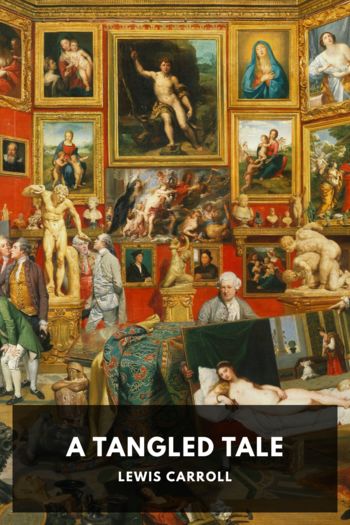GLASS SOUP - Jonathan Carroll (intellectual books to read TXT) 📗

- Author: Jonathan Carroll
Book online «GLASS SOUP - Jonathan Carroll (intellectual books to read TXT) 📗». Author Jonathan Carroll
Washing the Buffalo
Leni Salomon was in love and this time it was serious. After that bizarre luncheon with Isabelle and Flora, all that she wanted to do now was find him and go to bed for a couple of hours.
A month ago she would never have imagined thinking such things about this man. His name was John Flannery. Several times over the course of any day Leni found herself saying those names—John Flannery—just to have them on her tongue and then of course to think about him some more. She spent a lot of time, recently, thinking about that man.
To look at him, he was the most unlikely lover she could have imagined for herself. Physically, he was about a hundred miles away from her type. Much to her chagrin, Leni was a sucker for handsome cliches—the smoothies, elegantly dressed guys who were fluent in three languages, wore hair gel, and used those long elegant wallets that had slots for twelve credit cards and only fit in the breast pocket of a jacket.
But this Mr. John Flannery was shortish, roundish, and wore clothes that looked like they’d all just come out of a dryer without ever having said hello to an ironing board. He wore a salt-and-pepper beard and at fifty-four, bore a vague physical resemblance to Ernest Hemingway, of all people. She hated Hemingway’s books.
And he was fifty-four—twenty-two years older than Leni. When she thought about the difference in their ages it almost made her blush. Nevertheless that’s who he was and so be it. Leni Salomon was a pragmatist. She was handicapped. She was pretty. She had married the wrong man years ago but was not brave enough to leave him although she knew she would be much happier if she did. She recognized these things about herself and accepted them for no more or less than they were worth. Now she was in love with a man who already was a man on the day that she was born.
They met on a tram. He’d asked for directions to Sigmund Freud’s apartment. By the time they came to her stop in front of town hall they were laughing. He had already asked her to join him for coffee and she’d said yes. She never did things like that although men tried to pick her up all the time. It was definitely not her style, but five minutes into their first conversation she knew that she must listen to this man some more.
Four years before he had seen the light. Or rather one afternoon at his big desk in Silicon Valley he’d realized that what he was doing was only earning lots of money so that one day he could be old with lots of money.
A week later he had quit his job, cashed in everything, and started traveling. He’d been around the world twice since then and didn’t plan on stopping any time soon. He had seen the ghost of a Buddhist monk in Salyan, Nepal. Learned how to cook from a three-toque chef in Rome, trained a millionaire’s horses in Northern Germany, and helped a woman he’d met in that cooking class build a stone house on the island of Sifnos in Greece. These were the sort of experiences he wanted to remember when he was old. One of the reasons why Flannery quit his job in the first place was the realization that despite having lived over half a century, he had very few great memories. A few perhaps, a small handful, but nowhere near enough to justify the half century he had existed.
When he saw that Leni was lame, John smiled. No one had ever reacted like that before. She was both taken aback and intrigued by his response. It turned out that his mother had had polio as a girl. As a result, she walked with the same difficulty as Leni. He grew up learning to walk slowly so as to keep pace with her. Children aren’t used to walking slow. But early on it taught him patience and to pay more attention to his surroundings. He became much more observant and thus more appreciative of detail than most people he encountered.
Leni rarely talked about herself because she was shy, secretive, and at heart didn’t think she was a particularly interesting person. But she talked about herself a lot that day to Flannery. She talked at the café and more when they were sitting in the Volksgarten afterward. He asked questions that were personal but never out of line or prying. Compelling questions, ones that made her consider carefully before answering, although they were about her and the way she felt or saw things. It felt as if she were looking at herself in a new kind of mirror—one that showed her angles she hadn’t seen before. She told him things that day maybe she shouldn’t have, but afterward she only felt good about their conversation and was eager to see and talk with him again.
At the end of their first meeting, Leni gave him her cell phone number rather than that of the phone at home. Writing it down, she knew she was giving the one and not the other because she did not want to chance John calling and having her husband answer. Naughty, naughty she thought as she handed the slip of paper to Ernest Hemingway.
For a long time she had no idea where their connection was going. Flannery was hugely entertaining, smart, and always insightful. He was bright-eyed alive, wide open to life and its possibilities, even at his age. So many things he said stuck in her mind. She found herself thinking about them throughout the day. Especially after listening to her husband crow or whine about his latest business, blah-blah.
The contrast between the two men was enormous. One was thirty-four, handsome, successful, and closed to





Comments (0)